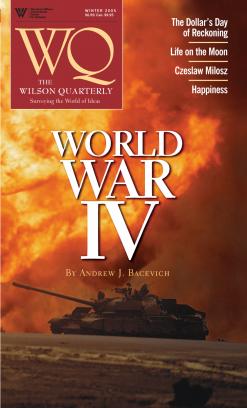World War IV


Latin America, once rife with dictatorships, now has all but two of its countries run by elected governments. The bad news: Many of them are struggling.
Afghanistan is quietly proving some post-9/11 critics wrong.
The mysterious Index of Consumer Sentiment.
Indonesia's government has been undergoing a quiet--and much-needed--process of reform.
John Lukacs examines why "liberal" has become such a dirty word.
The new army is swift and high-tech, but far from flawless.
The Booker Prize--still one of Britain's premier literary awards--is increasingly coming under scrutiny, and suffering a bit under the attention.
Many African nations, by necessity, import food to feed their populations, but more could be done to promote home-grown products.
Nuclear proliferation remains a threat, despite global efforts to prevent or preempt.
The 1996 federal reform of welfare was supposed to reduce dependency on government benefits, but that may not be happening.
Architects divide into "rads" and "trads" but no one seems to be building for the here and now.
Despite instant global communications, goods still travel at a comparatively plodding pace.
Mixed-race offspring in colonial America came less from master-slave relationships than from white servants pairing with slaves or former slaves.
Humans may be weaning themselves of natural selection, effectively halting their own evolution.
Journalists often boast of writing the first draft of history, but they can get the story wrong. But historians ought to borrow their storytelling flair.
Scientists marvel over DNA's structure and coding, even as they puzzle why it seems to never change.
Truman Capote's 1970s flameout was so spectacular that it obscured his earlier, brighter years.
Amartya Sen examines the theory of human rights.
Sperm donation has involved into a multimillion-dollar industry, opening the way for parents to shop for the attributes they value highly.
A new study suggests charter schools may outperform public schools in producing proficient students.
Examining the "gender gap" among conservative religious voters.
Can America "reinvent" its government to improve efficiency?
Many observers have linked recent anti-Semitic episodes in France with the same ancient enmities that led to the Holocaust, but something new seems at work.
There's no shortage of ideas for how the Democratic Party can rebound from 2004's election debacle.
Further thoughts on the collapse of the Soviet Union.
The author of Democracy in America sang the praises of the young republic, but later decried the "violent, intolerant, and lawless spirit" he saw in some parts of the country.
A neoliberal economist now thinks some capital controls may be necessary.
David J. Garrow reviews an "impressively intelligent book" that takes a harsh look at recent scandals of scholarship.
As reviewer Charlotte Allen notes, "Anyone seriously interested in [Flannery O'Connor's] well-deserved place in America’s literary pantheon should take a look" at two new books.
NATURAL LIFE:
Thoreau’s Worldly Transcendentalism.
By David M. Robinson. Cornell Univ. Press. 234 pp. $24.95
WHAT THE BEST COLLEGE TEACHERS DO. ...
Was the great playwright a lone genius, or simply an important part of a brilliant team?
By Robert McCrurn. Norton. 530 pp. $27.95
THE ESCAPE FROM HUNGER AND PREMATURE DEATH,
1700–2100:
Europe, America, and
the Third World.
By Robert William Fogel. Cambridge Univ. Press. 191 pp. $70 (hardcover), $23.99 (paper)
OBSESSIVE GENIUS:
The Inner World of Marie Curie.
By Barbara Goldsmith. Norton. 320 pp. $23.95
THE HEART OF THE WORLD: A Journey to the Last Secret Place. By Ian Baker. Penguin. 511 pp. $27.95
HAROLD LASKI AND AMERICAN LIBERALISM. By Gary Dean Best. Transaction. 204 pp. $34.95
THIS GREAT BATTLEFIELD
OF SHILOH:
History, Memory, and the Establishment of a Civil War
National Military Park.
By Timothy B. Smith. Univ. of Tennessee Press. 178 pp. $28.95
THE LAST OF THE CELTS.
By Marcus Tanner. Yale Univ. Press. 398 pp. $30
ISLAM IN URBAN AMERICA:
Sunni Muslims in Chicago.
By Garbi Schmidt. Temple Univ. Press. 242 pp. $64.50 (hardcover), $22.95 (paper)
BORN AGAIN BODIES:
Flesh and Spirit in American Christianity.
By R. Marie Griffith. Univ. of California Press. 323 pp. $55 (hardcover), $21.95 (paper)
America’s political and military efforts in the Middle East go by many names: War on terror. Clash of civilizations. Democratization. But our author argues that all of these undertakings grow from a fateful decision made decades ago that the American way of life requires unlimited access to foreign oil.
America’s falling dollar and mounting internationaldebt are not, as pundits often declare, the wages ofprofligacy and sin. They are the inevitable products of dysfunctional international financial arrangements—a system that now appears likely to come crashing down, with alarming implications for the American economy.
With the death last year of Czeslaw Milosz, the world lost a Nobel Prize–winning poet and a singular voice of the 20th century. A survivor of Nazism and communism, Milosz refused to regard the world bleakly—or to retreat into the romantic illusions that beckoned to many of his fellow intellectuals. His intimate verses declare the individual’s connection to history, his spiritual autonomy, and his innate dignity.
Down through the ages, philosophers and poets, politicians and theologians, friends and strangers have argued about the nature of happiness. They haven’t been able to settle on what happiness isexactly, but that hasn’t kept them from chasing it down. In the end, and the beginning, too, happiness may be a lot easier to experience than to define.
Nearly 170 years ago, an upstart New York City newspaper reported that an astronomer had discovered life on the moon. For days, the paper regaled its readers with tales of winged humanoids and intelligent beavers, and the public bought the story. Why did so many readers believe it?